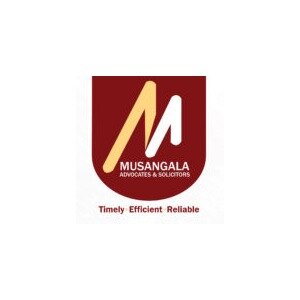Best Mining Law Lawyers in Uganda
Share your needs with us, get contacted by law firms.
Free. Takes 2 min.
Or refine your search by selecting a city:
List of the best lawyers in Uganda
About Mining Law in Uganda
Mining Law in Uganda is the body of regulations that governs the exploration, extraction, processing, and management of minerals within the country's borders. The primary objective of these laws is to ensure that mineral resources are developed in a socially and environmentally responsible manner, with economic benefits being channeled to the state, local communities, and private investors. The central statute governing the sector is the Mining and Minerals Act of 2022, which modernizes and replaces the previous Mining Act of 2003. The law sets out the framework for mineral rights, licensing, environmental protection, and dispute resolution related to mining activities.
Why You May Need a Lawyer
Mining activities in Uganda are subject to a complex legal and regulatory structure. Seeking legal advice may be necessary in several situations:
- You are an individual, company, or foreign investor interested in acquiring a mining or exploration license.
- You face disputes with local communities over land access or environmental impacts.
- You need help complying with environmental regulations and social responsibility obligations.
- You are negotiating joint ventures, investments, or partnership agreements in the mining sector.
- You are affected by government enforcement actions or regulatory compliance issues.
- You require assistance with due diligence during mergers, acquisitions, or asset transfers involving mineral rights.
- You are seeking compensation or remedy for wrongful expropriation, damage, or loss related to mining operations.
Local Laws Overview
Mining Law in Uganda is primarily governed by the Mining and Minerals Act of 2022. Key features of the local legal framework include:
- Licensing: The Act provides for several categories of mining rights, including prospecting, exploration, mining, retention, and mineral trading licenses. Each license has different eligibility criteria, application procedures, and obligations.
- Ownership of Minerals: All minerals in Uganda are vested in the State, and rights to explore or mine can only be obtained with government approval.
- Environmental and Social Obligations: Mining operations must comply with environmental laws and conduct Environmental and Social Impact Assessments before beginning activities.
- Community Engagement: License holders must consult with and compensate local communities affected by mining operations, and contribute to community development.
- Regulatory Bodies: The Ministry of Energy and Mineral Development and the Directorate of Geological Survey and Mines (DGSM) administer mining rights and enforce compliance.
- Taxation and Royalties: The Act outlines how royalties are to be paid, how revenues are shared, and the taxation of mining enterprises.
- Dispute Resolution: There are specific procedures for resolving disputes involving mining rights, including recourse to courts and administrative tribunals.
- Foreign Participation: Foreign companies are allowed to invest, subject to certain local content requirements and regulatory approvals.
Frequently Asked Questions
What is the process for obtaining a mining license in Uganda?
Applicants submit a formal application to the Directorate of Geological Survey and Mines, including documents that detail the area of interest, a work program, evidence of technical and financial capacity, and an environmental and social impact plan. The application is then reviewed, and if approved, a license is issued subject to various conditions.
Can foreigners own mining rights in Uganda?
Yes, foreign individuals and companies can acquire mining rights in Uganda, but they must comply with all local regulations and may need to partner with local entities or meet certain local content requirements.
Are there environmental regulations for mining operations?
Yes, mining operations must comply with the National Environment Act and related regulations. An Environmental and Social Impact Assessment (ESIA) is mandatory before the commencement of mining activities.
What royalties and taxes are mining companies required to pay?
Mining companies are required to pay royalties based on the type and value of minerals produced, as well as corporate income tax and other statutory levies. The exact rates are specified in the Mining and Minerals Act and related regulations.
How are community interests protected in mining areas?
The law requires miners to engage with local communities, obtain consent for land access, pay fair compensation, and support community development projects as part of their social responsibility commitments.
What happens if I operate without a valid mining license?
Engaging in mining activities without a valid license is illegal and can result in fines, imprisonment, confiscation of minerals, and closure of operations.
How are disputes in the mining sector resolved?
Disputes can be resolved through negotiation, mediation, or by referring the matter to the courts or relevant administrative bodies, such as the Mining Tribunal established under the Act.
What are the key government agencies involved in mining regulation?
The Ministry of Energy and Mineral Development and the Directorate of Geological Survey and Mines (DGSM) are the main regulatory bodies for mining in Uganda.
Are there requirements for local employment and procurement?
Yes, mining companies are encouraged to prioritize local employment and procure goods and services locally as part of local content regulations to boost local economic development.
Do artisanal and small-scale miners have specific legal provisions?
Yes, the law recognizes artisanal and small-scale mining and has tailored licensing and regulatory procedures to support this sector while ensuring compliance with health, safety, and environmental standards.
Additional Resources
If you need further information or support regarding Mining Law in Uganda, consider reaching out to the following:
- The Ministry of Energy and Mineral Development: The primary policymaker and regulator in the mining sector
- Directorate of Geological Survey and Mines (DGSM): Handles licensing, monitoring, and geological data
- National Environment Management Authority (NEMA): Regulates environmental compliance for mining operations
- Uganda Chamber of Mines and Petroleum (UCMP): Represents industry stakeholders and provides sector information
- Legal Aid Service Providers Network (LASPNET): Offers legal aid services, which can include mining-related matters
Next Steps
If you are considering entering the mining sector in Uganda or need legal advice on a mining-related question:
- Clearly define your objectives and gather all relevant information or documents relating to your mining interests
- Contact a qualified lawyer or law firm with experience in Ugandan Mining Law
- Seek initial consultation to understand your rights, obligations, and possible risks
- Engage your lawyer to handle licensing applications, draft contracts, manage negotiations, or represent you in any dispute
- Stay updated with new laws or regulations, as the regulatory environment may evolve
Lawzana helps you find the best lawyers and law firms in Uganda through a curated and pre-screened list of qualified legal professionals. Our platform offers rankings and detailed profiles of attorneys and law firms, allowing you to compare based on practice areas, including Mining Law, experience, and client feedback.
Each profile includes a description of the firm's areas of practice, client reviews, team members and partners, year of establishment, spoken languages, office locations, contact information, social media presence, and any published articles or resources. Most firms on our platform speak English and are experienced in both local and international legal matters.
Get a quote from top-rated law firms in Uganda — quickly, securely, and without unnecessary hassle.
Disclaimer:
The information provided on this page is for general informational purposes only and does not constitute legal advice. While we strive to ensure the accuracy and relevance of the content, legal information may change over time, and interpretations of the law can vary. You should always consult with a qualified legal professional for advice specific to your situation.
We disclaim all liability for actions taken or not taken based on the content of this page. If you believe any information is incorrect or outdated, please contact us, and we will review and update it where appropriate.
Browse mining law law firms by city in Uganda
Refine your search by selecting a city.















